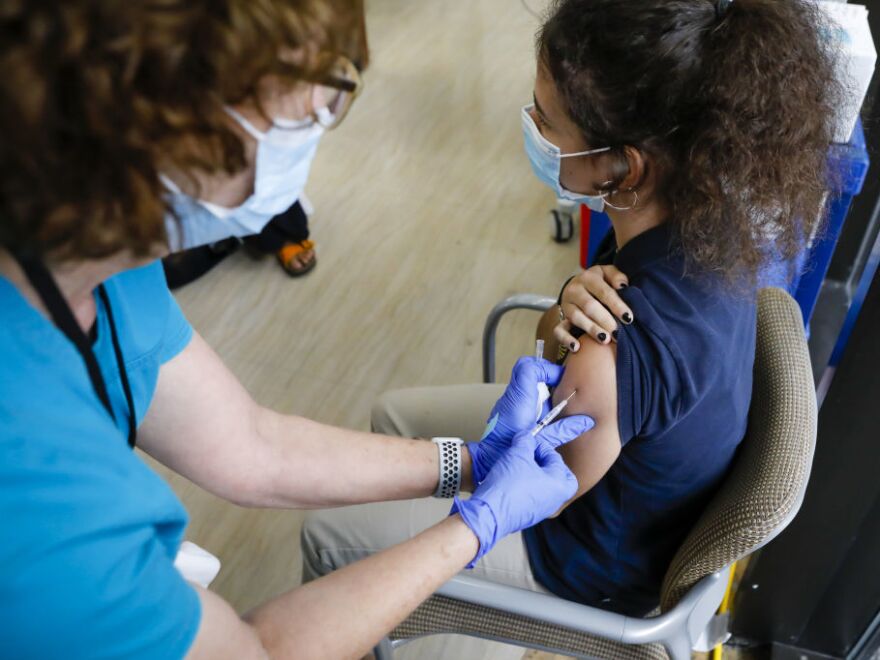Updated May 28, 2021 at 5:20 PM ET
The Centers for Disease Control and Prevention has revised earlier guidelines regarding mask use and vaccinations at summer camps. The updated guidelines, released Friday, now say that at camps where everyone has been fully vaccinated, campers can sing, play sports and weave baskets mask-free – except where required by local law.
"In a camp setting where everybody is fully vaccinated, there's no need for masking, there's no need for distancing. There's no need for screening, testing," said Cmdr. Erin Sauber-Schatz, lead of the CDC's Community Interventions and Critical Populations Task Force, which wrote the guidance.
"There is the potential, towards mid- to late summer, [for campers] to have a pre-pandemic camp experience when everyone is fully vaccinated, if that is offered," she added.
The agency's change in guidance was prompted by improvements to vaccine policies and pandemic trends since the last iteration of camp guidance in April, Sauber-Schatz said.
In May, the Food and Drug Administration authorized the Pfizer COVID-19 vaccine for use in children ages 12 to 15, and the CDC has issued guidance saying that fully vaccinated people no longer need to wear masks. "We're also continuing to see cases, hospitalizations and deaths fall," she said. "So this is translating to lower levels of community transmission, which is also making the camp experience safer."
More 2.5 million adolescents ages 12 to 15 have been vaccinated since the Pfizer vaccine was authorized for this age group, according to CDC data.
At camps where not everyone is vaccinated, the guidance said, vaccinated people still do not need to wear masks. But unvaccinated people are "strongly encouraged" to wear masks indoors, and also outdoors, in crowded situations.
"Maybe you have a bunch of kids together and you're shouting out camp cheers or singing songs," Sauber-Schatz said. "We know that COVID-19 has spread in scenarios where the respiratory droplets can go further, which is anytime you raise your voice. So in those higher risk situations, even outdoors, it makes sense to wear a mask."
The CDC is also recommending that masking and distancing continue for all people with weakened immune systems.
The CDC's earlier guidance for camps was criticized as too restrictive, leading members of Congress to call on the agency to soften the policy.
The new guidance may be good news for camps that have high rates of vaccinated campers. But the nearly 6 million adolescents ages 12 to 17 who have been vaccinated so far represent just 23% of that age group, the CDC said. While some smaller camps may be able to require full vaccination for counselors and campers, the more typical camp experience will include a mix of unvaccinated and vaccinated people.
But given how complicated it could be to run a mixed camp, some camps may choose simply to go with a policy that requires masks for everyone.
In that sense, it will be more like recent in-person schooling, where children are masked and physically distanced in indoor settings, said Sara Bode, a pediatrician at Nationwide Children's Hospital in Columbus, Ohio, who serves on the Council on School Health for the American Academy of Pediatricians.
Enforcing different rules based on vaccination status seems unrealistic, Bode said, so "most camps that I've talked to, even if they have some vaccinated [campers], even if their staff are fully vaccinated, will be requiring masks for everyone."
Even so, Bode said, camps that abide by the CDC guidelines will be able to provide safe, fun respites for kids who have been in front of screens all year. "Having that opportunity for unstructured play, peer interaction, getting outside, interacting with adults that are not their family members — these are all critical things for kids with their social-emotional growth and development," she said.
Here are highlights of the new guidance from the CDC website:
Copyright 2021 NPR. To see more, visit https://www.npr.org. 9(MDAxODg3MTg0MDEyMTg2NTY3OTI5YTI3ZA004))





